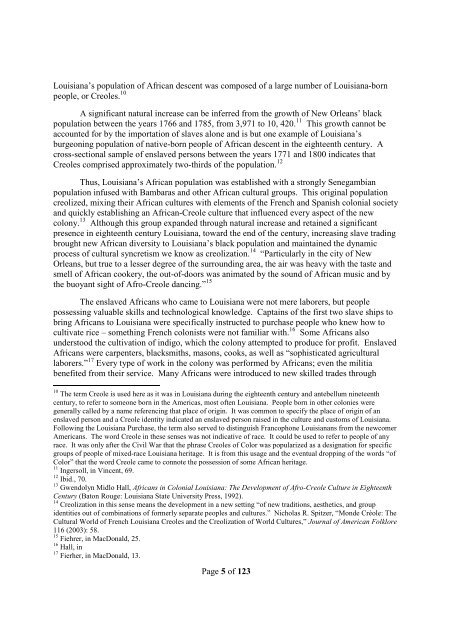The African American Experience in Louisiana
The_African_American_Experience_in_Louisiana
The_African_American_Experience_in_Louisiana
- No tags were found...
You also want an ePaper? Increase the reach of your titles
YUMPU automatically turns print PDFs into web optimized ePapers that Google loves.
<strong>Louisiana</strong>’s population of <strong>African</strong> descent was composed of a large number of <strong>Louisiana</strong>-born<br />
people, or Creoles. 10<br />
A significant natural <strong>in</strong>crease can be <strong>in</strong>ferred from the growth of New Orleans’ black<br />
population between the years 1766 and 1785, from 3,971 to 10, 420. 11 This growth cannot be<br />
accounted for by the importation of slaves alone and is but one example of <strong>Louisiana</strong>’s<br />
burgeon<strong>in</strong>g population of native-born people of <strong>African</strong> descent <strong>in</strong> the eighteenth century. A<br />
cross-sectional sample of enslaved persons between the years 1771 and 1800 <strong>in</strong>dicates that<br />
Creoles comprised approximately two-thirds of the population. 12<br />
Thus, <strong>Louisiana</strong>’s <strong>African</strong> population was established with a strongly Senegambian<br />
population <strong>in</strong>fused with Bambaras and other <strong>African</strong> cultural groups. This orig<strong>in</strong>al population<br />
creolized, mix<strong>in</strong>g their <strong>African</strong> cultures with elements of the French and Spanish colonial society<br />
and quickly establish<strong>in</strong>g an <strong>African</strong>-Creole culture that <strong>in</strong>fluenced every aspect of the new<br />
colony. 13 Although this group expanded through natural <strong>in</strong>crease and reta<strong>in</strong>ed a significant<br />
presence <strong>in</strong> eighteenth century <strong>Louisiana</strong>, toward the end of the century, <strong>in</strong>creas<strong>in</strong>g slave trad<strong>in</strong>g<br />
brought new <strong>African</strong> diversity to <strong>Louisiana</strong>’s black population and ma<strong>in</strong>ta<strong>in</strong>ed the dynamic<br />
process of cultural syncretism we know as creolization. 14 “Particularly <strong>in</strong> the city of New<br />
Orleans, but true to a lesser degree of the surround<strong>in</strong>g area, the air was heavy with the taste and<br />
smell of <strong>African</strong> cookery, the out-of-doors was animated by the sound of <strong>African</strong> music and by<br />
the buoyant sight of Afro-Creole danc<strong>in</strong>g.” 15<br />
<strong>The</strong> enslaved <strong>African</strong>s who came to <strong>Louisiana</strong> were not mere laborers, but people<br />
possess<strong>in</strong>g valuable skills and technological knowledge. Capta<strong>in</strong>s of the first two slave ships to<br />
br<strong>in</strong>g <strong>African</strong>s to <strong>Louisiana</strong> were specifically <strong>in</strong>structed to purchase people who knew how to<br />
cultivate rice – someth<strong>in</strong>g French colonists were not familiar with. 16 Some <strong>African</strong>s also<br />
understood the cultivation of <strong>in</strong>digo, which the colony attempted to produce for profit. Enslaved<br />
<strong>African</strong>s were carpenters, blacksmiths, masons, cooks, as well as “sophisticated agricultural<br />
laborers.” 17 Every type of work <strong>in</strong> the colony was performed by <strong>African</strong>s; even the militia<br />
benefited from their service. Many <strong>African</strong>s were <strong>in</strong>troduced to new skilled trades through<br />
10 <strong>The</strong> term Creole is used here as it was <strong>in</strong> <strong>Louisiana</strong> dur<strong>in</strong>g the eighteenth century and antebellum n<strong>in</strong>eteenth<br />
century, to refer to someone born <strong>in</strong> the Americas, most often <strong>Louisiana</strong>. People born <strong>in</strong> other colonies were<br />
generally called by a name referenc<strong>in</strong>g that place of orig<strong>in</strong>. It was common to specify the place of orig<strong>in</strong> of an<br />
enslaved person and a Creole identity <strong>in</strong>dicated an enslaved person raised <strong>in</strong> the culture and customs of <strong>Louisiana</strong>.<br />
Follow<strong>in</strong>g the <strong>Louisiana</strong> Purchase, the term also served to dist<strong>in</strong>guish Francophone <strong>Louisiana</strong>ns from the newcomer<br />
<strong>American</strong>s. <strong>The</strong> word Creole <strong>in</strong> these senses was not <strong>in</strong>dicative of race. It could be used to refer to people of any<br />
race. It was only after the Civil War that the phrase Creoles of Color was popularized as a designation for specific<br />
groups of people of mixed-race <strong>Louisiana</strong> heritage. It is from this usage and the eventual dropp<strong>in</strong>g of the words “of<br />
Color” that the word Creole came to connote the possession of some <strong>African</strong> heritage.<br />
11 Ingersoll, <strong>in</strong> V<strong>in</strong>cent, 69.<br />
12 Ibid., 70.<br />
13 Gwendolyn Midlo Hall, <strong>African</strong>s <strong>in</strong> Colonial <strong>Louisiana</strong>: <strong>The</strong> Development of Afro-Creole Culture <strong>in</strong> Eighteenth<br />
Century (Baton Rouge: <strong>Louisiana</strong> State University Press, 1992).<br />
14 Creolization <strong>in</strong> this sense means the development <strong>in</strong> a new sett<strong>in</strong>g “of new traditions, aesthetics, and group<br />
identities out of comb<strong>in</strong>ations of formerly separate peoples and cultures.” Nicholas R. Spitzer, “Monde Créole: <strong>The</strong><br />
Cultural World of French <strong>Louisiana</strong> Creoles and the Creolization of World Cultures,” Journal of <strong>American</strong> Folklore<br />
116 (2003): 58.<br />
15 Fiehrer, <strong>in</strong> MacDonald, 25.<br />
16 Hall, <strong>in</strong><br />
17 Fierher, <strong>in</strong> MacDonald, 13.<br />
Page 5 of 123


